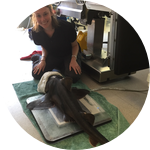About This Project
Interactions between humans and bats can be both beneficial and detrimental. Habitat loss worldwide has increased human-bat contact. Bats can carry diseases that have devastating effects on livestock and human health. Many are found in South East Asia, however the presence or absence of these diseases has never been studied in Fiji. Identifying how humans and bats interact in Fiji will improve bat conservation, and benefit human health if disease is found.
Ask the Scientists
Join The DiscussionWhat is the context of this research?
Bats play an important ecological role worldwide and the population of all six species in Fiji is declining. Due to human encroachment and agricultural development, there is potentially an increase in interactions between humans and bats including guano mining, consumption, cave tourism and human-wildlife conflict.
The distribution and conservation status of all 6 species of bats in Fiji has been sporadically documented over the past 40 years. Worldwide, bats can carry zoonotic diseases and contact between people and bats increases with human population expansion. We aim to provide a baseline investigation of the interactions and contact between people and bats in Fiji. We will also explore the prevalence of certain pathogens in Fijian bats through faecal and urine analysis.
What is the significance of this project?
We know that humans and bats interact in Fiji but what we don’t know how frequently or how intensely these interactions happen. Obtaining this information will give us a detailed understanding of the risk of disease posed by each interaction type (eg. Hunting, eating, guano mining, cave tourism).
One Health has a focus on diseases carried by bats as there can be devastating impacts of these diseases. We aim to contribute data to update advice regarding disease status in Fiji and public health information.
The minimally invasive method of sampling urine and faeces can also be used as a platform for future research.
What are the goals of the project?
The first aim is to quantify the interactions and contact between people (both local and tourist population) and bats by surveying communities around known bat habitats and roosts as well as surveying tourists visiting known bat habitats and roosts (eg. caves).
The second aim is to provide a baseline of disease prevalence of potentially zoonotic diseases in bats in Fiji. Targeted disease testing of pooled urine and faecal samples for paramyxovirus, coronavirus, Leptospira and histoplasma from bat species known to be consumed or where interactions with humans occur. The sampling method of below roost collection will eliminate handling of animals and decrease any negative impacts on the animals. The testing will be performed at Hopkirk Institute, New Zealand.
Budget
All accommodation, food and travel will support the local economy as much as possible. A local guide is required to access most roost sites due to cultural requirements and will again help support the local economy and improve participation in the study. The laboratory testing and consumables have been subsidised due to local collaborations at Hopkirk Institute, New Zealand.
Endorsed by
 Project Timeline
Project Timeline
Fieldwork for survey and sample collection will commence in August 2018 for a 10 week period. The samples will be transported back to New Zealand in October/November 2018 and testing commenced as soon as possible. Testing will be staged over several months and isolate one virus, bacteria or fungi at a time. This project will require final submission in December 2019/January 2020.
Aug 08, 2018
Travel to Suva, Fiji to meet with the Ministry of iTaukei Affairs, Nature Fiji and USP
Aug 19, 2018
Travel to Nakanacagi for first sample collection of Vanua Levu
Aug 27, 2018
Travel around 10 villages in the Bua Province of Vanua Levu collecting samples and surverys
Aug 27, 2018
Project Launched
Sep 29, 2018
Sampling around Vitu Levu
Meet the Team
Team Bio
I will collaborating locally with NGO Nature Fiji as well as University of South Pacific. My team in New Zealand is involved with bat research and public health worldwide including South East Asia and Africa.
Jessica McCutchan
Growing up I was surrounded by mentors in both veterinary science and public health in North Queensland, Australia. These two areas of science have always been a passion of mine as they are intertwined,
and have significant impact on both animals and people as well as our environment. After completing my veterinary degree in Australia and working in private practice, I started volunteering in developing countries and communities. It was through this volunteer work as a vet that I was reminded of the importance of public health and it’s relationship with zoonotic disease. Education is the key to improving Public Health, but this is difficult when there are large gaps in the knowledge on which to base this education. I have returned to continue my own education in the aim to pass this on to others through a Masters of Veterinary Science in Wildlife and Zoo Animal Health. A research project is required as part of my Masters studies and I chose this subject due to personal experience with bats in Fiji as well as the hope to start to fill in the knowledge gaps around zoonotic disease and public health in Fiji. I have presented on this topical at both the Wildlife Disease Association Australasia conference and Wildbase Symposium in 2017.
Additional Information
Five of the six species of bats in Fiji are listed from threatened to critically endangered on the IUCN list. (Bonaccorso & Allison, 2008; Brooke & Wiles, 2008; Hamilton & Helgen, 2008; Helgen, Palmeirim, & Allison, 2008; Palmeirim, 2008a, 2008b). Conservation of the bat species may be enhanced by discouraging future human interactions with bats if potentially zoonotic pathogens are isolated. There is also the opportunity to increase education surrounding bats and pathogens.
This study will identify any regional variations and help determine if Fiji’s relative geographic isolation and smaller bat population sizes means that these infections can persist there.
In 1971, a disease investigation into mosquito-borne infections included bats in the study and were found to be positive for Murray Valley encephalitis antigens (Maguire, Macnamara, Miles, Spears, & Mataika, 1971). To date this is the only disease investigation incorporating bats published data on diseases carried by bats in Fiji.
Project Backers
- 33Backers
- 101%Funded
- $4,568Total Donations
- $138.42Average Donation


